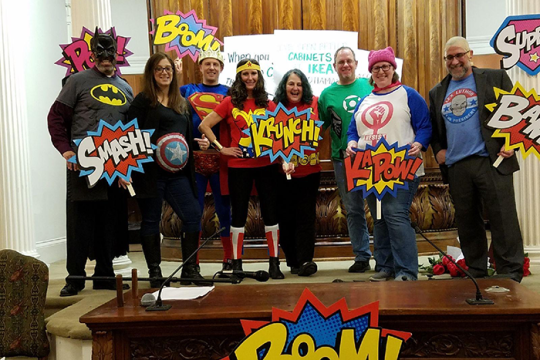At the core of Arendt/Heidegger: A Love Story, a new play by Douglas Lackey, is the intellectual, emotional, and romantic relationship between two of the leading intellectuals of the 20th century: Martin Heidegger, a renowned German professor who became an ardent Nazi, and his student Hannah Arendt, who became an ardent Zionist.
Their affair began in 1924 at the University of Marburg in Germany. Nineteen-year-old Hannah (Alyssa Simon) impressed Heidegger (Joris Stuyck) with her extraordinary intellect. Not only did she challenge Heidegger with her profound philosophical questions, she could recite Plato in Greek and volumes of German poetry from memory. Teacher and student also shared a deep love of art, music, and literature.
In this well staged and acted drama, directed by Alexander Harrington, Hannah and her married 35-year-old professor enter into a romantic relationship.
In 1925, while walking together in a forest (Kreisler’s “Liebesfreude” playing in the background), Hannah asks Martin to leave his wife for her. When he refuses, Hannah says, “She is an anti-Semite…Will you not have me because I am Jewish?” He insists he is not, but Hannah is not convinced and transfers to the University of Heidelberg to study with Karl Jaspers, who has a Jewish wife.
In one of the most powerful scenes, on May 3, 1933, Hannah sits in her room listening to the radio on the table next to a photo of Heidegger. Joseph Goebbels, Hitler’s minister for public enlightenment, announces:
… the world renowned German philosopher, Martin Heidegger, has joined the Nazi Party. On German Labor Day, on the day of the community of the people, the professor of Freiburg University, Dr. Martin Heidegger, made his official entry into the National Socialist Party… May he wear his party pin with pride….
Reacting as if she had been “struck by lightning,” Hannah looks at Martin’s photo and laments:
How could Hitler happen in Germany, in my Germany, Goethe’s Germany? … How can the Germans read Kant, who told them never to lie for any reason and then elect a man who lies with every breath? Lies about the war, lies about the socialists, lies about the Jews, a whole imaginary history? How could a philosopher who starts every lecture with the word “truth” on the blackboard follow this Prince of Lies? The demagogue whose standard of truth is his own mouth? The Germans voted Hitler in, but they will never get a chance to vote him out…
Lackey, a philosophy professor at Baruch College and the Graduate Center, City University of New York, says he was prompted to write the play in part as a response to the question of why so many people stand behind Donald Trump, even though they do not share his ideas. Why did Heidegger, he asks, “one of the great philosophy professors of his time, obviously not believing in the ideas of Nazism because they were too simple and stupid, nevertheless collaborate with the Nazis?”
The reason, Lackey suggests, is opportunism.
In philosophical terms, Lackey argues that Heidegger represents “the irrational spirit in philosophy and Arendt represents the rational.” These two currents of thought, he says, clashed in the 1930s and tragically, “the irrational defeated the rational.”
While Heidegger’s joining the Nazi Party enabled him to become rector of Freiberg University, his former Jewish lover was imprisoned in a Nazi internment camp in occupied France. Eventually she became a citizen of the United States and in 1951 wrote The Origins of Totalitarianism, which launched her career as a public intellectual.
Arendt continued to correspond and meet with Heidegger, despite his refusal to disavow the Nazi Party.
The play closes with a powerful final encounter between Hannah and Martin in the dining room of a Freiberg hotel in 1964. Before the curtain call we see an Arendt quote projected on a screen:
“The ideal subject of totalitarian rule is not the convinced Nazi or the dedicated Communist, but one for whom the distinction between fact and fiction… and the true and the false…no longer exists.”
Arendt/Heidegger: A Love Story is playing at Theater for the New City in Manhattan until October 14.
Related Posts

Extraordinary Ordinary Heroes

Women of Valor: Revisiting Biblical Role Models


